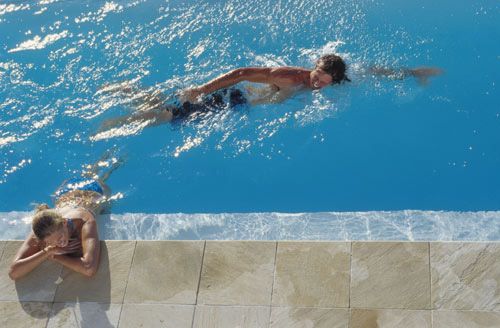Improve your physical condition and mood. Swimming is a low-impact, full-body workout that tones muscles and helps you relax.
From losing weight to improving the quality of sleep: here are seven reasons that make swimming a complete and effective sport
From losing weight to improving the quality of sleep: here are seven reasons that make swimming a complete and effective sport
The benefits of swimming and lifeguard course are virtually limitless. It's a great way to get firmer and a proven method of relaxation, which can even help fight to age. We tell you why we think everyone should take the time to swim.
Most everyone can swim
30 minutes of swimming burns up to 350 calories
Swimming helps build lean muscle mass
Many swimmers say it relieves aches and pains
Swimming helps you sleep better
Regular physical activity improves your mood
Swimming has a low risk of injury
Can everyone swim?
Swimming is great for everyone from pregnant women and the elderly to injured athletes and those who want to get back into shape or improve their fitness quickly. If you have any doubts or if you are coming out of a long period of inactivity, consult your doctor before starting, in order to avoid overloading.
Why is swimming so beneficial?
Swimming is one of the best forms of cardiovascular or aerobic exercise because it works almost every muscle in the body while increasing the heart rate *. 12 Weeks of Swimming Improve Blood Circulation Efficiency by 18%, Study Finds Water is nearly 800 times denser than air, makes it ideal for toning your body. , without putting additional pressure on your joints. It even slows down the aging process: scientists have shown that swimming between 3 and 5 times a week drastically reduces the risk of premature death.
What muscles do you use when you What muscles do you use when you swim?
Each time you swim is equivalent to a mini resistance session. With every kick, pull, or push, your muscles are working harder than you think, especially your arms, shoulders, and glutes - the muscles that sit idle when you're at the office. Swimming also strains your abs, or rather your core belt, and actually reduces your waist and hips. It is a decidedly complete exercise, which helps strengthen your body.
Can Swimming Improve Your Mood?
According to researchers, regular swimming can reduce stress, anxiety and fight depression, regardless of your fitness level and abilities. Being submerged in water dampens the sensations, allowing your body to be much more relaxed than in a gym, surrounded by mirrors and loud music.
And if you prefer to swim in the open air, recent studies have shown that swimming in open water and in the wild is a superb way (if it's cool) to improve your mood, your cognitive abilities and to naturally “get high”. Being outdoors will give you your vital dose of vitamin D, even in the darkest winter months. For more information on how to swim safely outdoors:
Can Swimming Help You Lose Weight?
Yes. Swimming burns calories and is ideal for losing weight or reducing body fat. By swimming at a steady pace for 30 minutes, expect to burn up to 350 calories, while a full hour in the pool will allow you to eliminate more than double that. As an added bonus, since swimming builds lean muscle mass, which in turn boosts your metabolism, you'll continue to burn calories as you shower, dry off, and on your way home.
Does swimming prevent injuries?
Swimming has a lower risk of injury than many other forms of exercise because the buoyancy of the water takes the pressure off the joints. It also acts as a natural pain reliever: in a study of people with chronic lower back pain, 90% of people surveyed said they had less pain after six months of regular swimming. As an added bonus, swimming has been shown to be able to reduce inflammation and help people with osteoarthritis. *
How can swimming improve the quality of your sleep?
According to a study by the National Sleep Foundation **, people who engage in regular physical activity, such as swimming, are twice as likely to get quality sleep. They are also less prone to insomnia or waking up in the morning.
For more articles like this and to enjoy training programs, swimming tips, and training videos, sign up for free at Speedo On.
* Source: Amateur Swimming Association (ASA)
** Source: Study conducted June 4-10, 2013 by Vision Critical which interviewed 4,120 randomly selected adults in the UK, US, France, and China.
Warning: Always consult a healthcare practitioner before starting any nutritional or training program. These exercise suggestions are not a substitute for proper health advice.



Post a Comment